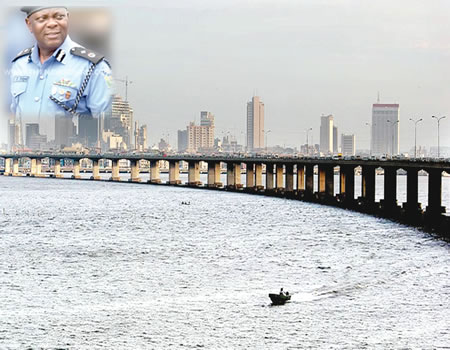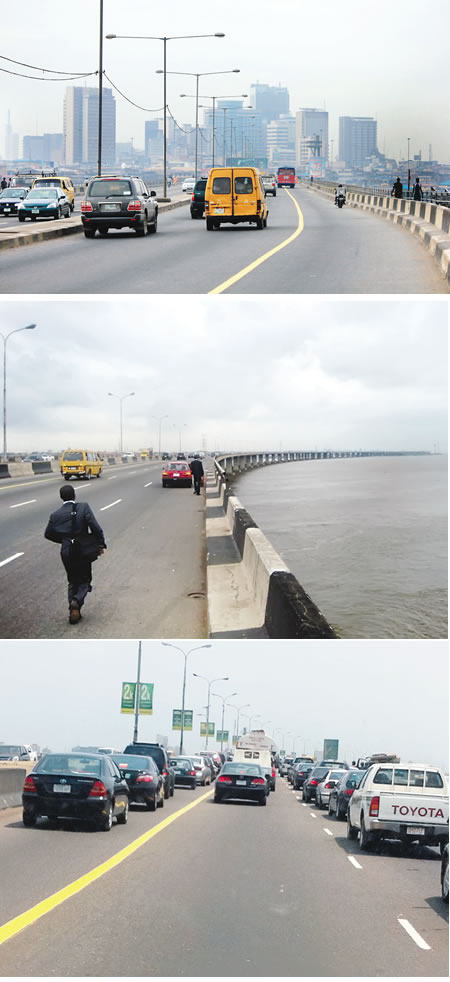Third Mainland Bridge, conceived and built by the regime of General Ibrahim Babangida, is the longest of the three bridges connecting Lagos Island to the mainland, the other two being the Eko and Carter bridges. Measuring about 11.8km in length, nearly all the residents and visitors to the state would have possibly made one contact or another with the N1 billion project by the construction giant, Julius Berger, since it was opened by the former military ruler more than 28 years ago.
Until it was dethroned in 1996 by Egypt’s memorial bridge in Cairo named October 6 (to commemorate the date of The Crossing, commencing the outbreak day of the Yom Kippur War in 1973), the Babangida vision and creation in Lagos State was the longest in Africa. But it has remained the “king” of vehicular movement in the nation’s commercial hub with thousands or residents and visitors alike commuting through it to different destinations.
Sorting out the daily largest movement of residents of the state has also expectedly come with the wear-and-tear implications, leading to the first major renovation work which was concluded in 2013, necessitating a very discomforting partial closure to the public at different times.
Five years after, the residents of the state are bracing up for another three-day total closure for repair in August (between 24 and 26) as recently announced by the Federal Ministry of Works, Housing and Power and the expected intermittent space reduction to allow for other minor works on the bridge for about 27 months (two years and three months).
Much water under the bridge…
The expected challenges of the imminent closure of the bridge with highest daily users are getting the residents to ask questions about convenience and comfort during the three days of total closure of the bridge that has become a very important part of their daily lives, despite the daily heavy and slow-moving traffic on it which brings a lot of discomfort to the users.
Jide (surname withheld) is a young engineer with many business interests in Lekki, the island part of the state. He was living in his family mansion in Magodo before the Third Mainland traffic stress of resuming at work in Lekki every day forced his relocation to the axis. Even now, he dreads visiting his parents in Magodo at the weekend.
“I love moving back to Lekki on Sunday. I can no longer bear the Monday traffic. No matter how early you set out, you will meet heavy and slow-moving traffic on the bridge, from Oworo (Oworosonki) end. The jeep (his four-wheel car) consumes fuel and one would just stay in the traffic, tired and angry and resume at work, not too organised. That is why I leave Sunday evening, though I would have loved to stay back with them (Dad and Mum),” he said.
Such story is common to many people who live on the mainland and work on the island. Many leave home as early as 4.00 a.m. to beat the heavy traffic and end up getting to work either too early when the traffic isn’t so bad or late to office spending hours when the traffic is totally locked down.
In recent times, however, the bridge is becoming more known for something darker. It was becoming the suicide capital of the nation before stringent security measures were taken to save lives and stop suicide-prone individuals from ending their lives in the lagoon on both sides of the eight-lane bridge.
Fatal and near-fatal crashes are also regular occurrences on the bridge. But it was the sudden spike in suicide, attempted suicide and failed suicides that got the Lagos State government, in collaboration with the security agencies, to station Rapid Response Squad (RRS) on the bridge and get it patrolled to catch suicide seekers in the act.
Mixed acts, mixed feelings
While this is certainly not the first time that the bridge would be closed for renovations, some events have occurred since the last closure of the bridge which have remained indelible with those who were involved affected or their relations.
Some people will live with the scar of their experience on the bridge. The mention of the Third Mainland Bridge will always fill such people with sour memory, while others would want a repeat of their unusual experiences on the bridge, which they still savour.
Apart from suicide and accidents, the bridge used to be popular for high incidence of robberies. Early last year, a senior citizen (name withheld) was almost robbed at gunpoint in traffic holdup on the bridge.
“The boys (robbers) kept banging the glass window of the car with their guns. We were terrified. Other motorists were looking at us but couldn’t help. At the point of shooting to scatter the glass window, suddenly there was a free flow of traffic and we zoomed off. It was a scary experience,” the senior citizen recalled.
The sudden fancy of those wishing to commit suicide to do it on the bridge by jumping into the lagoon could also be said to be a blessing as security has now improved on the bridge with the banning of okada from the facility equally bringing greater sanity to the environment.
One of the greatest things that have happened on the bridge since the last closure was the rare saving of lives of those who attempted jumping into the lagoon. Recently, operatives of the Rapid Response Squad saved a Uber driver from jumping into the lagoon from the bridge. The driver, Hameed Olojo, had driven a Toyota Corolla car to the middle of the bridge and attempted to jump into the river when an operative of the RRS grabbed him.
Olojo’s vehicle was quickly searched and a suicide note found, prompting the police personnel to take him to their office in Alausa, where the motive for the attempted suicide was unravelled. The man told the police that he wanted to kill himself over a N90,000 debt. He claimed he owed his boss N80,000 and had another N10,000 to pay at a court in Ikeja. By the sheer bravery of a police officer, he lived to tell his story.
Olojo was not the only fortunate one. A 17-year-old boy was also rescued from apparent suicide mission by gallant RRS men. His story was that he lost the N6,000 given to him by his mother to get foodstuff for the family. He felt he had eternally disappointed his mum and family. He wanted to end it all.
The teenager, who was just done with his secondary school education, claimed that the money and his phone were collected from him by a gang of miscreants who accosted him on the road and that he felt devastated that he had no option but to end his life. He is alive because of angelic policemen.
Residents of the state won’t forget in a hurry, how a textile trader was also saved by the vigilance of the policemen manning the bridge. She also attempted ending her life by jumping into the lagoon following her inability to pay a debt of millions of Naira. 58-year-old Taiwo Momoh had her life given back to her by heroic cops who sighted her earlier than her attempted jump into the lagoon. Police would later arraign her despite her plea of being duped of about N19 million by some unscrupulous bureau de change operators.
Policemen as first aiders
The police had prevented some other people from jumping into the lagoon but one noticeable improvement on the Third Mainland Bridge is the rapid response approach of policemen and other emergency workers to accidents and robbery attacks on and around the bridge.
A resident of the state, Kemi Adeyei Abu, remained excited about the conduct of policemen during a recent botched attack on her and some other persons. According to her, the police were gallant. “I want to appreciate the RRS for coming to our rescue today at Ilubirin under bridge, where we had a ruptured tyre. Sheu and his team were very professional. They kept the miscreants at bay and took charge of the situation while we fixed the tyre.”
The story of a pregnant passenger was more intriguing. Late last year, she was in a commercial bus when labour pangs began. The vehicle was on the Third Mainland Bridge and the only thing the driver could do was pull up. It took the intervention of the policemen on the bridge to rush the woman to the hospital where she safely put to bed. Saving mother and child was to the credit of the cops.
Seeing the helpful first aid the officers stationed on the bridge have been giving stranded and distressed users of the bridge, the state government recently donated some first aid kits to the police command in the state. The kits have become very handy for policemen on the Third Mainland Bridge. Victims of accidents with minor injuries are now patients to policemen on the famous bridge, who always come to their rescue. Many victims of accidents who do not require expert attention at the hospital are now being attended to on the bridge by policemen who are trained for that purpose.
There have also been rare instances where people openly confessed their admiration for policemen on the Third Mainland Bride for providing security and manual assistance to them when their vehicles broke down on the bridge. This is certainly a shift from the past when the bridge was one of the darkest black spots in the state.
The bad
When suicide attempts peaked on the bridge, authorities outlawed the usual indiscriminate temporary parking on the bridge, when such vehicles have not necessarily broken down. The ban, coming after the ban on okada, now makes stationary cars an irregular sight on the bridge except in case of accidents when other motorists either park to give a helping hand or held to the spot by the occurrence. Outside of such situations, vehicles seen these days not moving must be in one trouble or another and just like helping distressed bridge users, the policemen manning the road have also been helping their pockets, as Saturday Tribune found out recently.
Fleecing a reporter
Emmanuel, a journalist with a national newspaper, was driving to Lagos Island to meet up with an appointment penultimate Sunday evening when he ran into a bad patch of the road approaching the bridge. He was already on the bridge when he realised that he had badly punctured his front tyre. With no help in sight, he managed to get close to where the policemen were stationed and was encouraged by them to park at their point for a change of tyre. Unfortunately, the spare tyre was also not in good shape and this seeming hopeless situation provided the right situation for the policemen to “deal.”
While ruminating on who to call, one of the policemen walked up to him and offered to assist him get somebody to fix the tyre. He was in a dire situation, so the offer was a life-saver. The two policemen standing together when he pulled up at their point took a few steps away from him, closer to the edge of the bridge, to debate who to call and why.
“No, don’t let us call Azeez, the other one would come faster,” the reporter overheard them debate. So, the other one whose name the reporter couldn’t figure was called and the few seconds call was loaded with messages known only to an initiate.
Privileged Okada
Minutes after, a man on a motorcycle surfaced from one of the communities behind the lagoon. He had all manner of dirty-looking tool sacks tied to the equally dirty-looking motorcycle. It was later discovered as a decoy not to know the middle-aged man with a slight limp was actually into okada business cleared by his accomplice policemen for a lucrative route, which is out of bound to his less-privileged colleagues.
All the while, the policemen maintained a respectable distance from the negotiation that followed. After checking on the tyre, he agreed to take the extra away for proper fixing for N1,000 which the reporter agreed to because it was getting dark and rain was showing signals of coming. Fixing the tyre, anyway, would not have cost more than N500. The intriguing discovery was the man possessing vulcanizing tools which he used for the preliminary work of detaching the rim from the burst tyre. Could he possibly be the vulcanizer which he said he was taking the tyre to? The reporter didn’t wait to find out.
Then the shocker. His okada fee was N3,000. The stunned reporter couldn’t help asking if he was being fleeced because he appeared stranded. The man, with a smile, answered in the negative. The policemen’s eyes were fixed on the negotiation but they didn’t say a word. The reporter buckled and asked the man to take it away.
The reporter expected the policemen to prevail on their bike man but it appeared that policemen and people undertaking menial jobs for stranded motorists on the bridge are in one accord.
To further confirm this, another policeman was seen sauntering from another stranded driver who appeared to be out of fuel. Another okada was “sourced” for him who got him fuel from a nearby filing station for only-God-knows “transportation” fee. The policeman with them returned smiling, while the driver left during the reporter’s wait.
For almost one and a half hours, the man went away with the tyre. The rains came and the reporter took shelter under the policemen’s pavilion. At the prompting of the reporter, the two policemen kept calling the man. Finally, before the last sunlight disappeared, he appeared and the deal was settled. A total of N4,000 was used to fix the tyre, including an unsolicited gift from the reporter to the policemen after he cut the bike man’s fee to N2,000 which he took with gratitude.
Paid assistance?
Much as safety and emergency response have increased on the Third Mainland Bridge, Saturday Tribune also gathered that some security operatives might have devised means of extorting money from stranded motorists, all in the name of assisting them.
For every mechanical or electrical fault suffered by any vehicle on the Third Mainland Bridge, policemen seem to have “special” artisans who are swiftly called to come to the rescue of the stranded one, but be sure that you may have to pay through your nose as you are not only paying for the services of the artisans but also adding commission that will likely be shared among those running the cartel.
Peak period, good business
The peak period, when traffic is usually huge, has been observed to be in the morning when everybody is dashing to work and the closing period in the evening, when nearly everyone is returning at the same time. These two periods could be the good business season for the officers and their collaborating artisans and okada riders. When vehicles stay for too long on a spot or not having the opportunity of moving for fresh air, mechanical and electrical faults easily arise.
Sheriff, a member of staff of a new generation bank on the island, told Saturday Tribune that “the only thing I detest about going to work is the traffic on the Third Mainland Bridge. I am one of those who don’t enjoy moving on the bridge except during public holiday. I waste a lot of time on the bridge on my way to the office in the morning and returning home is the same.”
The banker urged the state and the federal governments to “create more alternative routes for drivers to the island and a more tactical traffic management mechanism should be deployed for the Third Mainland Bridge and neighbouring communities.”
Activities of vandals who have destroyed the railings by the sides of the bridge have also become worrisome to users of the road. Though the practice has subsided of late, a large part of the railings by the sides of the bridge have been vandalised.
The ugly
Residents won’t forget in a hurry, the incident of March 2017 that shook everywhere. A medical doctor, Allwell Orji, had stopped his driver on the bridge and jumped into the lagoon. His body was later recovered by emergency workers. This unfortunate incident has continued to echo a loud sound of mystery of the bridge. Residents are hoping that it would never get uglier than that. But with the kind of “assistance” being currently rendered on the bridge, prayer must be fervent about the wish.
Police react
The image maker of the state police command, Chilke Oti, told Saturday Tribune that the police had no record of connivance between policemen who were deployed to the bridge and artisans. He, however, stated that the authorities had noted the new trend and that proper investigations would be carried out to check the veracity of the allegation against the concerned policemen.
“The allegation is noted and will be investigated. However, it must be said here that nobody has ever reported that our men deployed to ensure security on the bridge connive with artisans to exploit them when their vehicles break down. Rather, we have been receiving thumbs up from members of the public for ensuring they ply the bridge safely with peace of mind day and night. Give us time to investigate it.
“For officers who are diligent with their work, the Commissioner of Police gives them letter of commendation which quickens their promotions. In fact, the command practically celebrates such officers,” Oti said.







